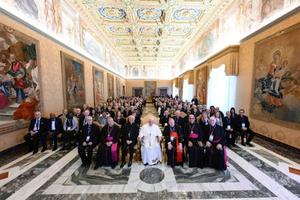Pope Francis: Church Must Play Her Part in ‘True Cultural Revolution’
Tells general assembly meeting of the Pontifical Academy for Life that the Church must acknowledge “delays and shortcomings” and that Academy members can no longer be limited to “specific situations of ethical, social or legal conflict.”

The Church must play her part in a “true cultural revolution” brought on by new technological developments by acknowledging her “delays and shortcomings” and drawing on scholars belonging to other religions and with different ethical visions of the world, Pope Francis has said.
In a speech to members of the Vatican’s Pontifical Academy for Life at the start of its Oct. 5-6 general assembly in Rome, the Pope noted that new biotechnologies are permitting “manipulations of life that were unthinkable until now” and posing “formidable questions.”
“It is therefore urgent to intensify the study and exchange on the effects of such evolution of society in a technological sense to articulate an anthropological synthesis able to face this epochal challenge,” he told the assembled academics, meeting to discuss the theme “Accompanying Life: New Responsibilities in the Technological Era.”
The Pope’s speech came after a controversial radical overhaul of the Pontifical Academy for Life during the summer. The changes chiefly comprised the appointment of new members including some who belong to other religions, publicly hold views at odds with the Church’s teaching on life issues, or have dissented from the teaching of Paul VI’s encyclical, Humanae Vitae.
Francis said Academy members’ counsel could “no longer be limited to the resolution of questions posed by specific situations of ethical, social or legal conflict” because the “human creature” is now in a “special passage of history” in which “ever new questions” about the meaning of human life, its origins and destiny “encounter each other in an unprecedented context.”
He noted a prevailing culture “obsessively focused on the sovereignty of man,” an “egomania” and a “very real cult of self” which has “grave consequences for all affections and bonds in life.”
This has led to “reckless materialism,” he said, which treats life to be “exploited or discarded for power or profit,” leading to “bitterness and pain”, poverty, conflict, rejection and abandonment. “Authentic scientific and technological progress,” he said, “should instead inspire more humane policies.”
The Pope highlighted how the Christian faith can enable this, saying it rejects “any concessions to nostalgia and lamentation,” but has instead a “vast tradition” of “generous and enlightened minds” who can offer what the world needs: the ability to “repair the fractures between generations.”
Francis then spoke of the need for a “theology of Creation and Redemption” to accompany the world, one which stresses how each creature is “wanted and loved by God.”
“The biblical account of Creation must always be reread anew,” he said, “to appreciate all the breadth and depth of the gesture of love of God Who entrusts creation and history of the world to the alliance of man and woman.”
Acknowledge Delays, Shortcomings
The Pope added that Church “must do her part” in a “true cultural revolution” that is taking place, which means “first and foremost acknowledging delays and shortcomings.”
These include subordination of women which must now be “definitively abandoned” and recognizing a “new beginning” that “must be inscribed in the ethos of peoples” and which must be incorporated into a “renewed culture of identity and difference.”
Francis called the “radically neutralizing” of sexual difference — often referred to as gender ideology — “not right,” saying the “utopia” of the “neutral” removes both the “human dignity of the sexually different constitution” and the “personal quality” of human reproduction.
Generating life “regenerates us,” the Pope said, and it “safeguards humanism.”
The Pope also called for respect for the different ages of life, in particular children and the elderly, and warned that a society which views the human person as commodity ends up building cities “hostile to children” and communities “ever less hospitable to the elderly.”
“The witness of faith in God’s mercy,” the Pope said, is the “essential condition” for having a “true compassion between different generations.”
All these challenges, he added, make the Pontifical Academy’s mission “difficult” but also “exciting,.”
Alluding to why he made those controversial appointments to the Academy over the summer, the Pope said he was sure there were scholars of “different orientations with regard to religion and with different anthropological and ethical visions of the world, who share the need to restore a more authentic wisdom of life to the attention of the people, with a view to the common good.”
“An open and fruitful dialogue can and must be established with the many who care about the search for valid reasons for the life of man,” he said.
Accompanying human life from conception to natural death is a task of “discernment and intelligence of love” for “impassioned men and women, pastors, not mercenaries,” the Pope said.
“May God bless your aim of supporting them with science and awareness of which you are capable,” he said in closing.
- Keywords:
- pontifical academy for life
- pope francis


















